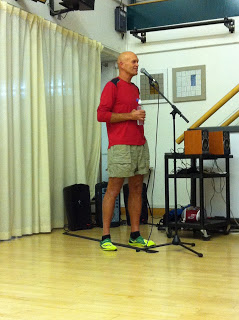In Christopher McDougall’s best seller ‘Born to Run’ he travells to the depths of Mexico to find “the phantom known as Caballo Blanco – the White Horse”. An American man who had lived with the Tarahumara, a ‘tribe’ of people who can run 50, 100 miles, even more without seeming to get injured, Caballo Blanco was, in McDougall’s description, the key to unlocking the secrets of the Tarahumara. My journey to meet Caballo Blanco (or Micha True) was slightly less ardjuous – he was giving a talk just over a mile from my flat.
“I left my beard and my loin cloth back at home”. Caballo didn’t look at all like the images stirred up by ‘Born to Run’. He looked like a regular ultra runner: tanned from time spent on the trails, lean but muscular and dressed in shorts, t-shirt and some minimal shoes. The shoes were what the crowd were eyeing. The room was full of Vibrams and it wasn’t long before he was asked about his thoughts on barefoot running.
“It’s a tool and like all tools it’s useful. It’s important to strengthen your feet, but it’s not a cure all for everything. There’s a place for shoes. I like lightweight shoes but I like cheap and free. Sometimes this minimalist shoe movement is quite maximal in terms of capital.”
In what could have been a reference to other runners who featured in ‘Born to Run’, Caballo made one thing clear: “I’m not here to sell you shoes. I’m here to talk about the Raramuri.” Asked about his feelings about the international bestseller Caballo says: “there’s things I’m happy with and things I’m not happy with and it’s up to me to take this voice and to spread the word of the Raramuri and the people who have inspired this book.”
Although McDougall acknowledges at the start of his book that the Tarahumara is the name Mexicans gave to the tribe and that Raramuri is the name they call themselves, he continues to refer to them as Tarahumara.
His first encounter with the Raramuri was during the Leadville 100 – a notorious 100 mile race. “I was running down the mountain feeling pretty good and some old guy in a skirt came running past me. He greeted me saying ‘queervo’ which is their equivilent of ‘hello’ but which means ‘we are one’. Well, we were one for a while and then he took off and went on to win the race. This was a 100 mile race won by a 55 year old guy.”
Caballo travelled to the Copper Canyon in Mexico where the Raramuri live. Through economic and social pressures they’ve been forced to work in low paid jobs and move away from their small social groups resulting in them running much less. An accomplished ultra runner himself, Caballo’s mission has been to encourage the Raramuri to run more through his annual Copper Canyon Ultra Marathon – the race that is central to McDougall’s story.
The race takes place every year and everyone who finishes wins corn, with the international runners giving all prizes back to the local Raramuri people. “The Raramuri in their small communities are invited to come and run with us, and they have a choice. So far I have seen change in a positive way. The people are running again and they are taking pride in who they are and that’s a really beautiful thing. I hope to keep it going for as long as we can.”
Caballo Blanco’s love for running and his respect for, and desire to help, the Raramuri was infectious. The message that I took away from his vast experience of running and living with these people was this: “If you eat the good food and live the good life and have love for other people: you win.”
To find out more about Caballo’s race, visit his website. and if you want to catch one of his talks while he’s in the UK, go here.

